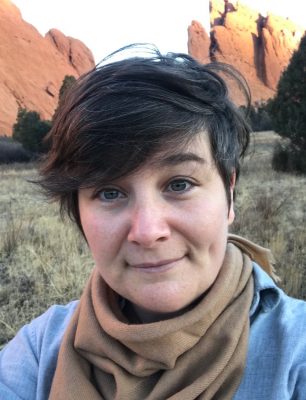by Emily Graham, ’22 (CLAS)
Wanting to learn more about our newest addition to UConn Waterbury’s English department, we asked Professor Sam Sommers about her own academic interests, what interested her about UConn, and what she hopes to gain through her teaching.

Sam Sommers, an Assistant Professor in Residence at UConn Waterbury, was already familiar with Connecticut before she was even hired. A graduate of Wesleyan University, Sommers recalled how she heard about the job and quickly knew the geography of where she could be teaching.
“Once I was hired, I was excited to relocate to the satellite campus,” Sommers says. “It is nice to have a small-school feel at the Waterbury campus while still being able to take part in all of the resources of a major research university. And I already felt at home because I was so familiar with the location already.”
Choosing to live in Hartford so that she could be equidistant to Storrs and Waterbury, Sommers has quickly fallen into her rhythm, as she teaches three classes this semester: African American literature, an American Studies seminar, and an introductory English class. She loves it, especially because UConn Waterbury is not an entirely traditional school. “A lot of my students are non-traditional — often, they’ve either worked full-time or have been in the military prior to schooling. That motivates me,” Sommers continues, “because I know how dedicated they are. I want to give that motivation back to them.”
Aside from teaching, Sommers writes a lot on her academic specialties, but it’s on a short hold for now. Trained in American literature — specifically works written by Americans and African Americans from the 19th century — Sommer has extensive publications based on her own research, as well as reviews on the work of others. Her 2015 article “Harriet Jacobs and the Recirculation of Print Culture” — an investigation on how Jacobs looked at the circulation of printed texts as a way to assert control, authorial power, and her own freedom from slavery — was recently republished in the 2018 Norton Critical Edition of Jacobs’ 1861 memoir Incidents in the Life of a Slave Girl. She is in the process of submitting a review about an epic collection of new work in African American print culture.
While she is not writing as avidly as she used to, Sommers hopes to get back to her most exciting work-in-progress: her book project. An in-depth look at the history of reading in the United States, Sommers’ project will sift through written representations of reading: how people thought of the activity; what constituted reading well; and how such values of critical thinking and self-edification soon became unfairly associated with American whiteness. “The more I studied representations of reading,” she explained, “the more it was clear how these values are working to discipline a standard of whiteness into the project of reading. But that didn’t always exist, and my project started because of that discrepancy.”
For now, Professor Sommers is taking a break. Though she hopes to soon receive funding and recommence the bookwriting process, she is very content with where she is right now. “I love teaching at UConn. There is no prescribed way to value education and receive a degree,” she elaborates, “and the Waterbury community is proof of that. Since Waterbury is not a commuter campus, that means community flourishes in the classroom.” Sommers added that such an atmosphere allows students to bring their whole selves to campus. And to her, when a student does that, “it is the beginning of their college education. They can now figure out what their interests are, how to talk about them, and how to contribute to, and reinterpret, the ongoing conversation.”